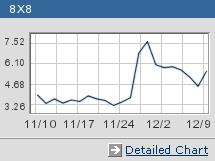
NEW YORK (CNN/Money) -
Looking at the biggest movers on the Nasdaq over the past few weeks, it's pretty clear that tech investors think they've found themselves the next big thing.
It's voice over Internet protocol, the technology that enables making phone calls over the Internet.
VoIP (pronounced as it sounds...i.e. rhyming with the way that a lifelong Brooklyn resident would pronounce "perp"), does have the potential to change the telecom industry. It's a more cost-effective way for carriers to offer voice services, which are rapidly becoming a commodity, and it allows telecoms to package voice and data over one line.
But aren't investors getting just a tad excited about the prospects for VoIP?
Dial S for speculation
A tiny company called 8X8 (EGHT: up $1.22 to $5.76, Research, Estimates), which offers a VoIP phone service called Packet8, has been among the Nasdaq's most actively traded stocks for the past two weeks. Shares were up more than 20 percent on Tuesday and have surged nearly 70 percent in the two weeks since Nov. 21.
8X8 has a market value of about $170 million, is not profitable and had revenues of only $4 million in the first six months of its latest fiscal year.
Can you say speculation?

| |
|
8X8 is one of several stocks that have surged on VoIP buzz over the past month.
|
|
Shares of a small firm called Z-Tel (ZTEL: down $0.02 to $2.07, Research, Estimates) are up 37 percent since Nov. 21. It has a VoIP service for home consumers and small businesses called Z-Line. Z-Tel isn't making money, either.
deltathree (DDDC: down $0.10 to $2.85, Research, Estimates), an unprofitable company that offers a consumer VoIP service called iConnectHere, has soared 32 percent in the past two weeks.
VocalTec (VOCL: up $0.68 to $5.10, Research, Estimates), which makes switches and other equipment for VoIP networks, has surged nearly 80 percent since Nov. 21. Profitable? What do you think? It lost $3.1 million in its latest quarter on $3.2 million in sales.
VoIP pioneer Net2Phone (NTOP: Research, Estimates), which has been publicly traded since 1999, has enjoyed a nice pop lately, too, surging 33 percent in the past two weeks.
Deja vu all over again
Jeffrey Citron, chairman and CEO of privately held Vonage, which has about 80,000 VoIP subscribers, admits that investors need to be cautious in the sector but that VoIP is a legitimate growth business.
"There is going to be a tremendous appetite for investing in the field of voice over IP from equipment manufacturers to service providers," said Citron.
| Recently in Tech Biz
|

|
|
|
|
Still, if investors aren't careful, they could get burned just as they did by plowing into shares of upstarts in other "next big thing" types of tech fads like Linux, business-to-business software (B2B), online banking and e-tailing.
With few exceptions, the big winners from hot tech trends are the established companies that are already profitable and can afford to spend money on research and development and marketing.
Which companies won the most from Linux? It wasn't the so-called pure-play Linux companies like Red Hat and VA Software (formerly VA Linux, which holds the record for the best opening day performance of an IPO with a whopping 698 percent gain). It was IBM, Hewlett-Packard and Dell.
The top B2B software companies? Not Ariba, Commerce One and PurchasePro, but rather Microsoft, SAP and Oracle.
There's no reason why that shouldn't happen again with VoIP. So on the service-provider side, the long-term winners are likely to be companies like Verizon (VZ: Research, Estimates), BellSouth (BLS: Research, Estimates) and SBC (SBC: Research, Estimates), as well as Comcast (CMCSK: Research, Estimates), Cox (COX: Research, Estimates) and Time Warner (TWX: Research, Estimates), which owns CNN/Money.
"There's a near-term opportunity for companies like Vonage and 8X8, but in the end it will be a battle between cable and telecom," said Erik Zamkoff, a telecom analyst with Independent Research Group.
SBC said last month that it would start to offer VoIP services early next year. Qwest made a similar announcement last week.
On the cable side, Time Warner said Monday that it hopes to roll out VoIP to most of its customers by the end of the year and is partnering with Sprint and MCI to do so.
On the equipment side, companies like Cisco (CSCO: Research, Estimates) and Motorola (MOT: Research, Estimates) will probably benefit more than smaller upstarts. Cisco, for example, makes switches and other networking gear for Vonage while Motorola provides adapters that allow Vonage users to make phone calls and surf the Web at the same time.
So investors should prepare themselves for a flood of VoIP press releases in the coming months, and they need to be particularly wary of the VoIP hype surrounding smaller, unprofitable companies. We've been here before.
"This is your typical speculative bubble where everyone wants to have their name associated with a hot technology," said Zamkoff.
Sign up to receive the Tech Biz column by e-mail.
Plus, see more tech commentary and get the latest tech news.

|

